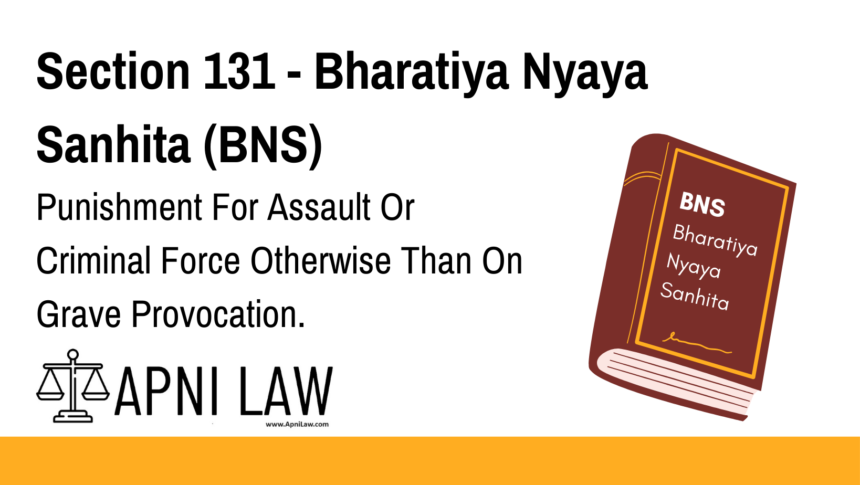Code: Section 131 BNS – Punishment for Assault or Criminal Force
Whoever assaults or uses criminal force to any person otherwise than on grave
and sudden provocation given by that person, shall be punished with imprisonment of either
description for a term which may extend to three months, or with fine which may extend to
one thousand rupees, or with both.
Explanation 1.—Grave and sudden provocation will not mitigate the punishment for
an offence under this section,—
(a) if the provocation is sought or voluntarily provoked by the offender as an
excuse for the offence; or
(b) if the provocation is given by anything done in obedience to the law, or by a
public servant, in the lawful exercise of the powers of such public servant; or
(c) if the provocation is given by anything done in the lawful exercise of the right
of private defence.
Explanation 2.—Whether the provocation was grave and sudden enough to mitigate
the offence, is a question of fact.
Explanation of Section 131 BNS
Section 131 of the Bharatiya Nyaya Sanhita (BNS) prescribes punishment for assault or criminal force, except when caused by grave and sudden provocation.
Key Provisions:
- Punishment for Assault or Criminal Force:
- If a person assaults or uses criminal force without grave and sudden provocation, they may face up to 3 months of imprisonment, a fine of up to ₹1,000, or both.
- What is Grave and Sudden Provocation?
- It refers to a situation where an act provokes an individual so intensely and unexpectedly that they react immediately.
- Exceptions to Provocation as a Defense:
- A person cannot claim mitigation due to provocation if:
- They deliberately provoke someone to create an excuse for assault.
- The act that provoked them was lawfully done by a public servant.
- The act that provoked them was done in self-defense.
- A person cannot claim mitigation due to provocation if:
- Determination of Provocation:
- Whether provocation was grave and sudden is a question of fact, meaning it is determined based on specific circumstances in each case.
Illustrations of Section 131 BNS
Example 1: Unprovoked Attack
A is standing at a bus stop. B, without any provocation, slaps A. Since B was not provoked, he is guilty under Section 131 BNS and can be punished.
Example 2: Deliberate Provocation
A intentionally insults B to make him react. B, in anger, pushes A. Here, B cannot claim provocation as a defense since A’s words alone do not justify using criminal force.
Example 3: Assault on a Public Servant
A police officer, while lawfully arresting C, puts handcuffs on him. C, in anger, pushes the officer. Since the officer was acting lawfully, C cannot use provocation as an excuse.
Example 4: Provocation Due to Self-Defense
A tries to attack B, but B defends himself and pushes A back. A then assaults B, claiming provocation. Since B acted in self-defense, A’s claim of provocation will not reduce his punishment.
Common Questions and Answers on Section 131 BNS
1. What is the maximum punishment under Section 131 BNS?
The maximum punishment is three months of imprisonment, a fine of ₹1,000, or both.
2. Can provocation always reduce punishment under this section?
No. Provocation does not reduce punishment if:
- The offender deliberately provokes the victim.
- The provocation comes from a public servant acting lawfully.
- The provocation results from self-defense actions.
3. What is the difference between assault and criminal force?
- Assault: Making someone fear the use of force (without actual contact).
- Criminal Force: Physically using force on someone without consent.
4. Can words alone amount to provocation under Section 131 BNS?
No. Mere words do not justify assault or criminal force, unless accompanied by other circumstances.
5. What legal remedies does a victim have under Section 131 BNS?
A victim can:
- File an FIR with the police.
- Approach a court for legal action.
- Seek compensation for any harm caused.
Conclusion
Section 131 BNS ensures that individuals who assault or use criminal force without valid provocation face legal consequences. However, it also recognizes situations where grave and sudden provocation may justify a reduced sentence—except in specific cases.
For more legal insights on BNS and related sections, visit ApniLaw today! 🚀










